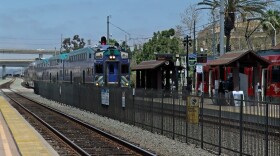For many of the long-term unemployed, time has run out.
Until this past week, emergency jobless benefits lasted as long as 99 weeks for people in the hardest-hit states. But with five people unemployed for every job available, 99 weeks might not be long enough.
Since the 1950s, the federal government has consistently extended emergency unemployment benefits whenever the jobless rate has been more than 7.5 percent. On Capitol Hill, lawmakers are using unemployment benefits as a sweetener for a deal on the Bush-era tax cuts, working on a compromise that would temporarily extend both policies.
Sustained high rates of unemployment could result in an unemployed underclass disconnected from the workforce, economist Kevin Hassett says. He tells NPR's Audie Cornish that it may be time to rethink the federal unemployment insurance program altogether.
The Psychological Cost
A lengthy stint without a job doesn't just take an economic toll, says economics professor Arthur Goldsmith. It has real physical and psychological costs.
"Work organizes a person's day," Goldsmith tells NPR's Cornish. "It connects you with other people. It places you in part of something that's bigger than just you."
Workers who have lost their jobs may miss the structure of employment and feel a loss of agency, says Goldsmith, who teaches at Washington and Lee University in Virginia. For some people, it can result in anxiety and depression, as well as self-destructive behaviors such as drug and alcohol abuse, and even violent outbursts.
Goldsmith says that after a long period of unemployment, the jobless may experience drastic psychological changes, similar to going through stages of grief.
Most newly unemployed people approach the job search with a good effort. "They search hard," he says. "And they believe the bout will be short and [after] a good night's sleep … it will all be over."
Helplessness starts to set in as weeks and months of unemployment go by.
"That then begins to change your mindset," Goldsmith says. "But it also alters the way potential employers look at you."
Still, even if people get a job offer after being unemployed for a long time, he warns, they shouldn't automatically take it.
"If they were to take a job that would not enhance their marketability in the future, it can actually be damaging to them as they search for jobs when the economy actually begins to grow again."
Alternatives To The Current Benefits System
Hassett, director of economic policy studies at the American Enterprise Institute, points to Germany's work-sharing program as a viable alternative to the current federal unemployment insurance program in the U.S.
In lean times, German employers can reduce the hours for some of their workers, who then receive a fraction of the unemployment insurance they would have been eligible for if they were laid off completely.
"That's good for employers because when they start to expand again, they don't have to have a costly search for new workers," Hasset says. "And it's great for workers because they don't have to be disconnected from the workforce, and they don't have to go through the shame of saying they're unemployed."
Countries with work-sharing programs will suspend them when "times are good again," he says.
In 1978, California became the first state to offer a work-sharing program. And a number of states have followed suit -- although all those programs are dwarfed by standard unemployment-benefits programs.
Other alternative unemployment insurance programs can make compensation less dependent on how long a worker has been unemployed, which would prevent people from being penalized if they take a job early, Hassett says. For example, instead of receiving a check every week, an unemployed worker would receive one or two payments upfront.
The longer somebody doesn't have a job, the harder it is to get a new job.
Ultimately, job searching is a lot easier to do if you already have a job.
"The longer somebody doesn't have a job, the harder it is to get a new job," Hassett says. "The reality is that if you're out of [a] job, and you're looking for a job, then the new employer's going to say, 'Well, why don't you have a job now? What's wrong with you?' "
Hassett warns that sustained cyclical unemployment could become a "structural problem" if the number of unemployed people isn't cut soon.
Copyright 2022 NPR. To see more, visit https://www.npr.org. 9(MDAzMjM2NDYzMDEyMzc1Njk5NjAxNzY3OQ001))






